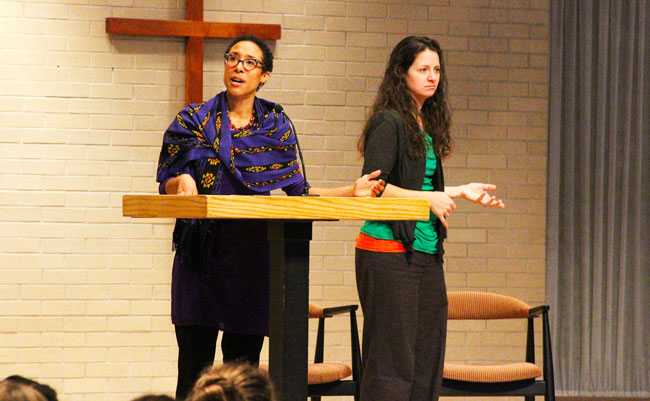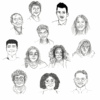The following is a a letter written by Sarah Thompson that was shared via the MLK committee. Thompson was the featured speaker for MLK Jr. Weekend on Goshen College’s campus this past January.
Dear Goshen College community,I’m so glad for all of our interactions on MLK weekend! I felt very well cared for and hosted by all of you. I felt truly respected by the entire community’s willing engagement with the material, as surprising as it was.
I was asked to share more of my thinking with regards to methodology.
I hope the concept of “working with discomfort to prepare us for the great challenges of working across race and class experiences” was able to sink in because of the use of popular education methodology–especially employed during convocation. As you may know, popular education is a group of techniques that disrupt the binary of incoming expert = teacher and local students = learner…reminding us all that we are teachers and learners simultaneously. Also, theater of the oppressed popular education methods function using the element of surprise, turning social expectations upside down in order to reveal what’s under the surface for each of us. In my experience I’ve gained the most knowledge through popular education and participatory action. I wanted to bring what has been most useful to me, to you all in this community that I love so much.
As we saw, a lot comes up when expected patterns change rapidly. Thanks for joining me on that journey of experiencing discomfort and working through it.
The process of popular education is not complete until it leads to informed and reflective action. In my opinion, the ongoing interchanges/questions/frustrations like these represent that we are still in the popular education cycle of MLK Study and Celebration Day. Great conversations are still happening! Are you rubbing your kidneys and ankles, and breathing deep to keep all the intense energy moving? 🙂
This is a difficult political moment to speak into! I spent some time last semester on campus asking many people about what topics they wanted to hear. I toiled over many drafts. I approached a number of committed scholar-activists to help me carefully craft elements of the speech that would be truly relevant to students and to the issues of this moment on campus, refracted through a broader historical lens. Talking about discomfort just didn’t cut it. We needed to feel it in a safe way, and practice working with it. Noting the awkward optics of interrupting a young woman of African descent–and wanting to respect Black women’s labor and voice–Naomi Gross and Mimi Salvador agreed to contribute; at some risk to themselves. As we prepared, we trusted the Spirit and the GC community to work through all the stuff that comes up when things aren’t done the way we are used to them being done.
I continue to believe that the most important racial justice lesson we can learn today is to get used to being able to breathe in this place of discomfort and not needing to run to comfort, blame, judgment.
The more we can do that, the more creative and collaborative our actions for justice and peace become! Increasing our ability to make compassionate space for unresolved tension–while we organize for justice–will allow us to embrace our humanity in this time of hatred, roboticization, and the violence committed as a shortcut to “relieve tension that the Other brings into our lives.”
To the question of whether the interruption was planned or not: it was left unresolved at the end of Convocation in a way that mirrors the unresolved political moment we are in, on campus, in the US, and on the planet. What will the uncomfortable moment motivate each of us to do? What patterns do our bodies and minds do when our sense of right and wrong is challenged? We need to know these, so we can notice when we’re having a reaction, and decide to respond consciously instead.
When I said that this interruption was a gift, I meant it. Though I knew when the initial outburst would occur and how I hoped it enhanced learning, after it happened I was going with the flow too! I said everything that I had planned to say. Since Naomi and Mimi and I decided that you all could handle the ambivalence, it only later became clear to me about 45 minutes after Convocation that the entire day should the “container” for the popular education experience. I hadn’t necessarily planned that in advance, as these scenarios just evolve depending on the community involved. I was learning alongside you. Still am.
If you were uncomfortable with Mimi and Naomi’s actions, or the justice issues that they and other student activists raise often on campus, engage them. They received some intense reactions, including from faculty and staff members, that show me we still have a ways to go in engaging what makes us uncomfortable, and challenges our training around what constitutes respect, appropriateness, and order. They interrupted after I shared about the historic Poor People’s campaign (because you can read about it!). This is a great year, 50 years exactly, to study all of King’s speeches in 1967 for your classes if you have the opportunity. We chose these issues to name because of their intersection with anti-black racism and the fact that if a new Poor People’s Campaign is not decolonial, anti-sexist, and global then it won’t succeed. In Elkhart County, our piece of the puzzle is organized by People’s History of Elkhart. It’s inclusive, grounded, and beautiful. I hope each of you finds a way that your work can connect to it. For example, there will be opportunities for artists, social justice internships, and spaces for reflection.
During the speech I especially invited the people who were still upset to stay and participate. We revealed the interruption plan during the Town Hall. Record numbers showed up. Because of this delay in revelation, we were able to hear students share some very important issues and reactions that would not have come out if the discomfort had resolved during convocation. I was so impressed with how students grappled with intersectionality, the concern to address ongoing anti-black racism on campus, and the allyship and compassion a number of them demonstrated. I was pleased to see all of the faculty of color at the Town Hall, along with the President and key administration members. However, there were very, very few white teaching faculty there. Many students surfaced important issues surrounding power and inclusion, and relationships with faculty. They parsed with precision and dignity the struggles they face on campus, and articulated their hopes for GC. I witnessed numerous healing conversations happening.
What are you motivated to do now? What will you disrupt? How? There is great enthusiasm about offering more regular antiracism training; contact Alexa Valdez from LSU to get involved!
As an Anabaptist, I am part of an unruly tradition where ordinary people were reclaiming space, even interrupting sermons. We have documentation of at least 19 times that happened. So that influences me to upend decorum every once in awhile for the sake of losing our life to gain it. May this moment somehow encourage you to do internal and/or external work that makes you show up for racial and ecological justice in a way you never have before. The movement, including but not limited to, a re-ignited Poor People’s Campaign, needs you! Challenge oppression wherever it shows up. Even in the case of an invited guest, even if it’s a person of color…if they have positional power (as I do in the Goshen-Elkhart community, with my organization, etc.), if things are not practical and intersectional, or if they are doing damage (such as indigenous erasure, or Obama deporting millions and expanding drone warfare), I’m still extending an invitation to folks to disrupt–however you decide is most strategic. Check that your motivations are healthy, and then don’t worry about institutional image or personal reputation. I understand this perspective is not something that everyone may agree with. It just is where I am in this spiritual-political moment, and I’ve seen it lead to nonviolent change. I am on this journey, but am by no means an expert! I’m totally open to strategizing, recognizing we’ve all got different gifts and leanings…let’s see how much tension we can hold and still support each other!
You are in my thoughts and prayers, please let me know if there is anything else I can do to support you all, and of course you truly are welcome in my home when you come through Chicago!
Onwards together,
Sarah
P.S. If anyone wants the words I can send them the breakfast speech and the article I’m writing about what we learned throughout the day, which includes the Convo speech: email me at director@cpt.org with subject line “MLK Day 2017 Speeches”. When you write, please tell me a little bit about yourself too.




